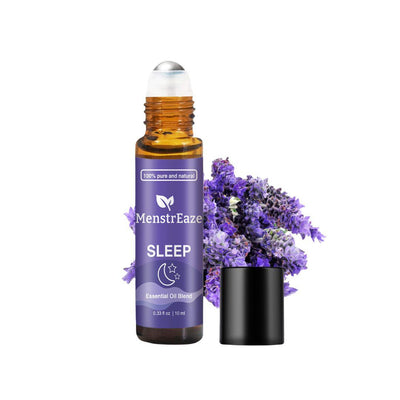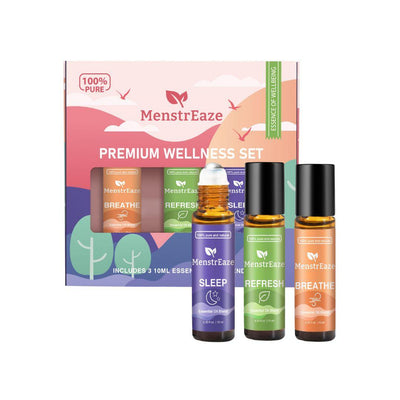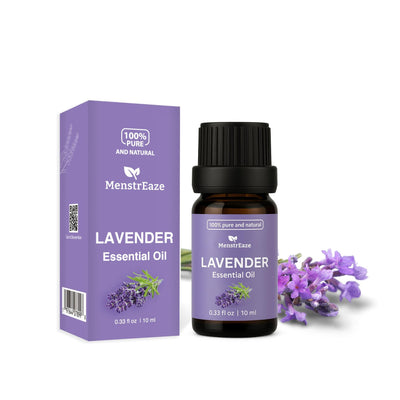Finding a peaceful night's sleep can often feel like a distant dream in our busy lives. The allure of a natural solution to this common struggle has led many to explore the world of essential oils. These aromatic extracts from plants have been used for centuries, and modern interest in holistic wellness has brought them back into the spotlight as potential sleep aids. This exploration delves into the science behind sleep essential oils, highlights some of the most effective options, and specifically examines how they can benefit women navigating the unique sleep challenges that arise throughout their lives.
The Science of Scent and Sleep: How Essential Oils Work Their Magic
The practice of aromatherapy, which involves inhaling the scents or vapors of essential oils, has roots stretching back to ancient times for various therapeutic purposes [1]. The way these oils interact with our bodies and minds is fascinating. When we inhale the aroma of an essential oil, the scent molecules embark on a direct journey to the olfactory bulb in our nose [2]. This bulb is uniquely connected to the limbic system, a crucial part of the brain that governs our emotions, memories, and the autonomic nervous system, which plays a vital role in regulating sleep [1].
It is believed that specific chemical compounds within essential oils can influence our brain chemistry, leading to various effects. For instance, lavender, a widely recognized sleep aid, contains compounds such as linalool and linalyl acetate. Research indicates that these components can have a calming effect on the nervous system [1]. Furthermore, some essential oils have the potential to interact with neurotransmitters in the brain. Gamma-aminobutyric acid (GABA) is one such neurotransmitter, known for its role in promoting relaxation and sleep. Certain essential oils and their constituents are thought to enhance GABA activity, contributing to their sleep-inducing properties [4]. Beyond calming the nervous system, some evidence suggests that essential oils might even influence the production of hormones that regulate our sleep-wake cycle, such as melatonin [4]. While the precise mechanisms are still under investigation, the connection between our sense of smell, the brain's emotional center, and the observed effects on sleep suggests a powerful interplay at work [2]. The reduction of anxiety and the soothing of the nervous system appear to be significant pathways through which these natural remedies can help us drift off to sleep more easily.
Meet the Sleep Superstars: Key Essential Oils for Rest
When it comes to essential oils for sleep, certain varieties consistently rise to the top, backed by both traditional use and scientific exploration.
Lavender: The Queen of Calm
Lavender essential oil is arguably the most renowned and extensively studied essential oil for promoting sleep and relaxation [1]. Research suggests that inhaling its aroma can significantly decrease the time it takes to fall asleep, improve overall sleep duration, and enhance the restorative deep sleep phase known as slow-wave sleep [11]. Numerous studies have demonstrated improved sleep quality in individuals struggling with insomnia, particularly women, younger adults, and those with milder forms of sleep disturbance [1]. Nighttime exposure to lavender aroma has even been shown to reduce feelings of sleepiness upon waking [1]. Physiologically, lavender may contribute to relaxation by lowering both heart rate and blood pressure [2]. It is believed to interact with GABA, a neurotransmitter that helps quiet nervous system activity, promoting a state of calm [14]. Linalool, a primary chemical constituent of lavender oil, is thought to positively influence the brain's central nervous system and may also play a role in increasing serotonin levels, further supporting its sleep-promoting effects [1]. The extensive research across diverse populations underscores lavender's potential as a versatile and effective natural sleep aid.
Chamomile: Gentle Tranquility
Chamomile, a plant with two main varieties – Roman and German – offers gentle tranquility for those seeking better sleep [1]. Roman chamomile essential oil is particularly known for its ability to reduce anxiety, while German chamomile is often used for its pain-relieving properties [1]. Chamomile is thought to target the same areas in the brain and nervous system that are affected by common anti-anxiety medications [45]. Studies have indicated that chamomile extract can lead to a significant increase in sleep quality, especially among older adults [47]. Apigenin, a flavonoid found in chamomile, is believed to exert mild sedative effects by binding to receptors in the brain that modulate GABA [13]. Furthermore, the aromatherapy use of chamomile essential oil has been shown to reduce anxiety and improve overall sleep [11]. By addressing both anxiety and potentially pain, chamomile offers a multifaceted approach to promoting restful sleep.
Valerian Root: Earthy Slumber Aid
Valerian root has a long history as a traditional sedative, recognized for its potential to aid sleep [5]. Its aroma is often described as earthy and somewhat pungent, which some individuals might find less appealing [61]. Valerenic acid, a key compound found in valerian root, is believed to play a significant role in its sleep-promoting effects by increasing GABA levels in the brain [5]. Research suggests that valerian root can help reduce the time it takes to fall asleep (sleep latency) and improve the overall quality of sleep [6]. It may also be beneficial in easing nervous tension and reducing feelings of anxiety [58]. Valerian is thought to act as a partial agonist for both GABA-A and adenosine receptors, both of which are crucial inhibitory neurotransmitter systems linked to the mechanisms of sleep [5]. While its effectiveness is supported by some studies, others have shown inconclusive results [5]. Nevertheless, for those who find the aroma tolerable, valerian root essential oil presents a natural option for supporting sleep, particularly for individuals dealing with insomnia and anxiety.
Other Beneficial Oils for Sleep:
Beyond lavender, chamomile, and valerian root, a variety of other essential oils offer potential benefits for sleep:
- Bergamot: This citrus oil is known for its calming properties and may help lower blood pressure and reduce anxiety [1].
- Cedarwood: With its woodsy scent, cedarwood oil has a sedative effect and may help increase total sleep time while reducing early morning awakenings [1].
- Clary Sage: This herbaceous oil has an antidepressant effect and can help reduce cortisol levels, potentially improving sleep by alleviating anxiety [1].
- Jasmine: Known for its sweet, floral aroma, jasmine oil can be calming, reduce restlessness, and improve sleep quality, with some studies suggesting it may be as effective as certain sleep medications [2].
- Sandalwood: This oil with a rich, earthy aroma can provide anxiety relief and promote relaxation, potentially increasing non-REM sleep and reducing nighttime wakefulness. However, it can be stimulating for some individuals [1].
- Ylang-Ylang: This essential oil with a floral, sweet scent has a calming effect on the nervous system, helping to reduce stress and anxiety, and may even lower heart rate and blood pressure [1].
- Vanilla: The sweet and comforting scent of vanilla can calm the nervous system, reduce restlessness and hyperactivity, and may provide relief from anxiety and depression [2].
- Frankincense: With its grounding aroma, frankincense essential oil is known to decrease stress and anxiety and can also help to open breathing passages, potentially aiding sleep [2].
- Rose and Geranium: These floral oils are known for their calming effects and ability to reduce stress and anxiety. Geranium may also help to balance hormone levels [2].
- Sweet Marjoram: This oil with a sweet, herbaceous scent is traditionally used to promote relaxation, decrease anxiety, alleviate pain, and reduce symptoms of insomnia [12].
- Neroli: Derived from the flowers of the bitter orange tree, neroli essential oil is calming and may improve sleep and reduce anxiety, particularly for women during menopause [4].
- Vetiver: This oil has a grounding and balancing effect with a deep, earthy aroma. It can be sedative and may help to decrease obsessive thoughts that can keep one awake [11].
- Petitgrain: Extracted from the leaves of the bitter orange tree, petitgrain essential oil can stimulate calm, relaxation, and a good night's sleep, although it can also increase alertness in some individuals [8].
- Lemon: This citrus oil is uplifting and may help to relieve anxiety and depression, which can indirectly improve sleep [3].
- Thyme, Peppermint, Eucalyptus, Clove, Pine: These oils may help to reduce snoring by opening the airways [3]. Peppermint may also alleviate menopausal symptoms and aid sleep [24]. Eucalyptus can be energizing for some [40].
- Juniper: Known for its fresh, pine-like aroma, juniper essential oil is calming and grounding and may improve sleep quality and alleviate hot flashes during menopause [31].
- Sweet Orange: This uplifting oil promotes feelings of peace and cheerfulness and may relax muscles, leading to increased restfulness [13].
- Basil: Basil essential oil has a fresh, herbal aroma that is both calming and uplifting and may help with stress and anxiety, potentially also balancing hormones [24].
- Mandarin: Mandarin oil is calming and may improve sleep quality and ease symptoms associated with menopause [13].
The wide range of essential oils with sleep-promoting properties suggests that individual responses can vary. Experimentation may be necessary to discover which oils are most effective for a particular person's needs and preferences.
Tailored Tranquility: Essential Oils for Women's Sleep
Women's sleep patterns can be particularly sensitive to hormonal fluctuations that occur throughout their lives [1]. Essential oils can offer natural support during these times.
During the Menstrual Cycle and PMS:
Hormonal shifts during the menstrual cycle and premenstrual syndrome (PMS) can often lead to insomnia, anxiety, and physical discomfort, all of which can disrupt sleep. Certain essential oils may help alleviate these symptoms and promote more restful nights. Lavender, clary sage, rose, geranium, and chamomile are often recommended for their calming and hormone-balancing properties [12]. Clary sage, in particular, is believed to have estrogen-like properties that may assist in regulating hormone levels [27]. Rose essential oil has also been shown to reduce PMS symptoms and improve sleep quality [12]. By addressing the various physical and emotional challenges associated with the menstrual cycle, these essential oils can contribute to improved sleep.
During Pregnancy:
Sleep can become a significant challenge during pregnancy due to physical discomfort and the dramatic hormonal changes the body undergoes. When considering essential oils for sleep during this time, safety is paramount. After consulting with a healthcare professional, some essential oils that are generally considered safe to use include lavender, chamomile (German or Roman), frankincense, neroli, petitgrain, and rosewood [25]. However, it is important to note that certain oils should be avoided during pregnancy, such as clary sage, basil, and peppermint in large amounts [25]. Research on the use of essential oils during pregnancy is still somewhat limited, but studies have shown some efficacy of lavender in reducing stress, insomnia, and anxiety in pregnant women [26]. Therefore, with proper guidance from a healthcare provider, certain essential oils can be a gentle way to support sleep during pregnancy.
During Perimenopause and Menopause:
The hormonal fluctuations experienced during perimenopause and menopause can cause significant sleep disturbances, including the often-debilitating symptoms of hot flashes and night sweats. Several essential oils have been highlighted for their potential to improve sleep during this life stage. Lavender, chamomile, neroli, and rose are frequently recommended for their calming and sleep-promoting effects [1]. Clary sage and geranium are also considered beneficial as they may help to balance hormone levels and alleviate some of the common symptoms of menopause [27]. Additionally, bergamot and sandalwood have shown promise in improving sleep quality in menopausal women [1]. Peppermint essential oil may also offer relief from hot flashes and contribute to better sleep [24]. By addressing hormonal imbalances, reducing anxiety, and potentially easing specific symptoms like hot flashes, essential oils can be a valuable tool for women seeking natural ways to improve their sleep during perimenopause and menopause.
Unlock Restful Nights: Different Ways to Use Sleep Essential Oils
There are various methods for incorporating sleep essential oils into your nightly routine, allowing you to choose the approach that best suits your preferences and needs.
Diffusion:
Using an essential oil diffuser is a popular method that disperses the oil molecules into the air for inhalation [2]. It is generally recommended to use an ultrasonic diffuser, which uses water and vibrations to create a fine mist, rather than heat-based diffusers that can alter the oil's properties [15]. Diffusing for approximately 30 to 60 minutes before bedtime can help create a calming atmosphere in your bedroom, preparing you for sleep [2]. Placing the diffuser in your bedroom ensures that the soothing aromas are present in your sleep environment.
Topical Application:
Applying essential oils directly to the skin allows for absorption into the bloodstream. However, it is crucial to always dilute essential oils with a carrier oil, such as jojoba, almond, or coconut oil, to prevent skin irritation or sensitivity [1]. Recommended application points include pulse points like the wrists, temples, and the back of the neck, as well as the soles of the feet or the chest [3]. General dilution guidelines for adults typically range from a 1% to 3% concentration [20].
Soothing Baths:
Adding essential oils to a warm bath can be a wonderfully relaxing way to wind down before sleep [2]. To ensure the oils disperse safely in the water and don't irritate the skin, it is best to mix a few drops of your chosen essential oil with a carrier oil or Epsom salts before adding the mixture to the bathwater [2]. Taking a bath approximately one to two hours before your intended bedtime can further enhance its sleep-promoting effects [15].
Pillow Sprays and Linen Mists:
Creating a homemade pillow spray or linen mist is a convenient way to introduce calming scents directly into your sleep environment. This can be done by diluting a few drops of your preferred essential oil in water along with a solubilizer such as witch hazel or rubbing alcohol in a spray bottle [2]. Spritz the mist lightly onto your pillows and bedding before going to sleep. It is important to avoid over-spraying, as this could potentially stain fabrics or create an overwhelming aroma [15].
Direct Inhalation:
For a quick and easy way to experience the benefits of essential oils, you can simply inhale the scent directly from the bottle or by placing a few drops onto a cotton ball and inhaling gently [3]. This method can be particularly useful for immediate relaxation or when other application methods are not readily available.
The Evidence Speaks: Research Supporting Essential Oils for Sleep
A growing body of research supports the effectiveness of certain essential oils in improving sleep quality. While more extensive studies are always valuable, the current evidence offers promising insights, particularly for lavender, chamomile, and valerian root.
Multiple studies indicate that the aroma of lavender can improve subjective sleep quality, increase the duration of deep sleep (slow-wave sleep), reduce alpha brain waves (associated with relaxation), and decrease overall sleep disturbance [1]. Lavender has shown effectiveness in addressing insomnia and anxiety across various populations, including students, individuals with heart disease, postpartum mothers, and women experiencing menopause [1].
Research suggests that chamomile essential oil and extracts can improve sleep quality, reduce anxiety levels, and exert mild sedative effects. This is potentially attributed to the flavonoid apigenin found in chamomile, which may interact with GABA receptors in the brain [1].
Studies on valerian root indicate that it may improve both subjective and objective measures of sleep quality, reduce the time it takes to fall asleep, and increase GABA levels in the brain [5]. However, it is important to note that some studies have not shown significant effects, and the distinct aroma of valerian root can be a deterrent for some individuals [5].
Specifically regarding women's sleep, studies have highlighted the benefits of lavender for improving sleep in women with insomnia and those going through menopause [1]. A blend of bergamot and sandalwood essential oils was found to improve sleep quality in healthy women [1]. Inhaling neroli essential oil significantly improved sleep quality in menopausal women [23], and clary sage was shown to reduce cortisol levels in menopausal women [13]. This growing body of evidence suggests that essential oils, particularly lavender, can be a valuable complementary approach to improving sleep, especially for women facing specific sleep challenges.
Crafting Your Slumber Sanctuary: Popular Essential Oil Blends for Sleep
Combining different essential oils can create synergistic effects, where the blend is more effective than the individual oils used alone [12]. It also allows for the creation of personalized aromas that you find particularly soothing. Here are some popular essential oil blends commonly used to promote sleep:
|
Blend Name |
Key Ingredients |
Primary Benefits |
|
Serene Night |
Lavender, Chamomile, Roman Chamomile, Frankincense |
Promotes relaxation and sleep. |
|
Calming Dream |
Clary Sage, Chamomile, Bergamot, Ylang Ylang |
Calming and sleep-inducing. |
|
Sweetest Sleep |
Lavender, Sweet Orange |
Soothing and uplifting, promotes relaxation. |
|
Silent Night |
Frankincense, Cedarwood, Roman Chamomile |
Quieting for the mind, comforting, and relaxing. |
|
Bye Bye Anxiety |
Lavender, Bergamot |
Grounds the mind and soothes the body, perfect for stress relief. |
|
Goodnight Blend |
Cedarwood, Frankincense, Roman Chamomile |
Calming and relaxing, helps with falling asleep. |
|
Relax Blend |
Frankincense, Lavender, Palma Rosa, Roman Chamomile |
Promotes relaxation and a sense of well-being. |
|
Sleep Aid (Plant Therapy) |
Neroli, Valerian Root, Lavender, Ylang Ylang, Green Mandarin |
Calming, relaxing, and sleep-promoting. |
|
Liquid Sleep |
Lavender, Frankincense, Vetiver, Atlas Cedarwood, Valerian |
Deeply relaxing and grounding. |
|
Sleep All Night |
Cedarwood, Patchouli, Roman Chamomile |
Grounding and calming, promotes restful sleep. |
|
Good Night (Floral) |
Lavender, Bergamot, Ylang Ylang |
Sophisticated floral aroma that induces sleep. |
|
Soothing Slumber |
Lavender, Cedarwood, Frankincense |
Classic combination for sweet dreams. |
|
Sleep Tight (Hormonal) |
Lavender, Sandalwood, Clary Sage |
May help with hormone-related insomnia. |
|
Spa Slumber |
Lavender, Vetiver, Palmarosa, Rose |
Luxurious and relaxing aroma. |
|
Power Down |
Clary Sage, Bergamot, Cypress |
Calming and stress-reducing. |
|
Sleep for Daaaayyyyssss |
Juniper Berry, Bergamot, Vetiver |
Wintry and grounding, promotes deep relaxation. |
|
Liquid Sleep (Simple) |
Cedarwood, Lavender, Marjoram |
Relaxing and sleep-inducing. |
|
Sleepy Thyme |
Thyme, Marjoram |
Calming and relaxing. |
|
Night at the Spa |
Lavender, Lime, Peppermint |
Refreshing and relaxing. |
|
Sleep Massage Blend |
Frankincense, Ylang Ylang, Orange |
Uplifting and relaxing, promotes restfulness. |
|
Winding Down Massage Blend |
Pine, Marjoram, Melissa, Cinnamon |
Calming and soothing for muscles and mind. |
|
Sleep Serum |
Valerian, Roman Chamomile, Lavender |
Promotes restful sleep. |
|
Tranquility Blend |
Valerian, Roman Chamomile, Patchouli, Marjoram |
Calming for the mind before sleep. |
It is encouraged to experiment with different blends to discover which combinations you find most effective and aromatically pleasing. Individual scent preferences can significantly influence the perceived benefits of an essential oil blend [42].
Safety and Serenity: Important Precautions When Using Sleep Essential Oils
While essential oils are generally considered safe for most people, they are potent substances and should be used with caution [8]. Understanding and adhering to safety guidelines is crucial for a positive experience.
- Dilution is key: Always dilute essential oils with a carrier oil before applying them to the skin [1].
- Patch test: Before applying an essential oil blend more widely, perform a patch test on a small area of skin to check for any adverse reactions [20].
- Avoid ingestion: Essential oils are not intended for internal consumption [15].
- Keep away from sensitive areas: Avoid contact with the eyes, inner nose, ears, and mucous membranes [15].
- Pregnancy and breastfeeding: If you are pregnant or breastfeeding, it is essential to consult with a healthcare professional before using essential oils, as some are contraindicated during these times [15].
- Children and pets: Exercise caution when using essential oils around children and pets. Some oils are not suitable for young children [77]. When diffusing, ensure that pets have the option to leave the room if they are bothered by the aroma [78].
- Medications and health conditions: Be aware of potential interactions with medications you may be taking (such as sedatives, antidepressants, or anti-hypertensive drugs) and consult your doctor if you have any pre-existing health conditions [14]. For example, valerian may counteract the effects of sedatives and antidepressants [62], and lavender may lower blood pressure and increase sleepiness when combined with certain medications [14].
- Quality matters: Choose pure, high-quality essential oils from reputable sources [13]. Look for oils that have undergone quality testing, such as those with an ISO stamp [13]. Be cautious of essential oils that are sold at very low prices, as they may be diluted or of poor quality.
- Photosensitivity: Some citrus essential oils, including bergamot and lemon, can cause photosensitivity, making your skin more susceptible to sun damage. Avoid direct sunlight after applying these oils topically [12].
Your Guide to Gentle Slumber: Safe Usage and Dosage of Sleep Essential Oils
When incorporating essential oils into your sleep routine, it's best to start with a low concentration and observe how your body responds [20]. Individual needs and sensitivities can vary, so finding the right dosage may involve some gentle experimentation.
- Diffusion: Begin by adding 2 to 3 drops of essential oil to your diffuser. You can adjust the number of drops based on the size of your room and your personal preference. Diffuse for 30 to 60 minutes before going to bed. Avoid prolonged diffusion in poorly ventilated spaces [2].
- Topical Application: For topical use, start with a 1% dilution. This generally means adding 1 drop of essential oil to each teaspoon of carrier oil. If you find this to be well-tolerated, you can gradually increase the concentration to 2% or 3% [20].
- Bath: When adding essential oils to a bath, use between 5 and 10 drops. Always mix the essential oils with a carrier oil or Epsom salts before adding them to the bathwater [4].
- Pillow Spray: For a pillow spray, use a low concentration of essential oils. A general guideline is to add 10 to 30 drops of essential oil to every 100 milliliters of water or hydrosol. Be sure to shake the bottle well before each use [15].
- Direct Inhalation: If you choose to inhale directly from the bottle or a cotton ball, take a few slow, deep breaths. This is usually sufficient to experience the aromatic benefits.
Remember that finding the ideal dosage and application method may take some time and observation. Pay attention to how your body reacts and adjust accordingly.
Conclusion: Embracing the Aromatic Path to Better Sleep
Essential oils offer a promising and natural avenue for improving sleep, particularly for women who may experience unique sleep challenges throughout their lives due to hormonal fluctuations. From the calming embrace of lavender to the gentle tranquility of chamomile and the grounding support of valerian root, a variety of oils can help create a serene environment conducive to restful nights. By understanding the science behind these aromatic wonders and exploring the various ways to use them safely and effectively, you can embark on a journey towards more peaceful sleep and enhanced overall well-being. Remember to choose high-quality oils, prioritize safety by diluting and performing patch tests, and always consult with a healthcare professional if you have any underlying health conditions or are pregnant or breastfeeding. Embracing the aromatic path may just be the key to unlocking the restful sleep you deserve.









